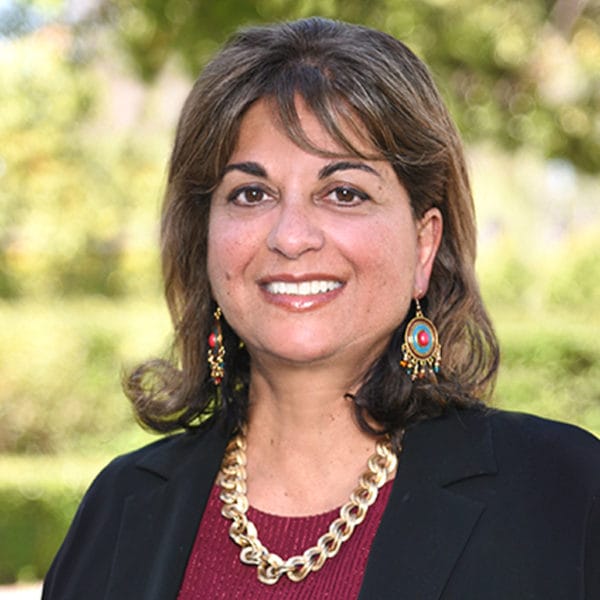Ruqayya Yasmine Khan joined CGU’s Department of Religion in 2013 as the Mohannad Malas Chair of the MA Program in Islamic Studies. Khan’s research interests embrace Arabic literary studies (both medieval and modern), Qur’anic studies, women and gender studies, and the digital age and religion. Khan’s more recent scholarly interests include late antiquity and Islam, origins of Islam, and the literary cultures of Umayyad Damascus and Abbasid Baghdad. She teaches seminars on Islam, women and gender, and the Qur’an at CGU. She is also the faculty coordinator for the Critical Comparative Scriptures Doctoral Program in CGU’s Department of Religion.
Before coming to CGU, Khan was a visiting faculty member in the religion departments at Swarthmore College and the University of California at Santa Barbara. She then taught for over a decade and was tenured in the department of religion at Trinity University in San Antonio, Texas. She has received travel and research fellowships from the American University of Cairo in Egypt as a fellow for C.A.S.A (Center for Arabic Study Abroad); the Andrew W. Mellon Foundation; the Ford Foundation; the Fulbright-Hayes Award for Teaching and Research at the Institute of Islamic Studies, University of Sarajevo, Bosnia Herzegovina; and at CGU, awarded by the Fletcher Jones Foundation for her publication concerning Hafsa bint ‘Umar ibn al- Khattab, a significant female figure of the early Muslim community. She serves on the steering committee for the study of comparative religion at the American Academy of Religion and on the editorial boards of several journals in the field.
Khan also actively works as a public intellectual, having been interviewed by PBS Religion & Ethics News Weekly (national), as well as PBS SoCal World and the Los Angeles Times. She has also appeared in and contributed to numerous interreligious and interfaith initiatives and forums at churches, synagogues, and mosques, and she served as the Coolidge fellow in a research “crosscurrents” colloquium at Union Theological Seminary, New York in 2004.
Khan is the author of the book Self and Secrecy in Early Islam (University of South Carolina Press, 2008), which maps the relationships between the concepts of secrecy and identity in early Islamic cultures. Khan’s latest monograph Bedouin and Abbasid Muslim Cultural Identities: The Arabic Story of Majnun Layla (Routledge Press, 2019) deals with one of the most important and influential works of early Arabic-Islamic literature. It embraces a comparative methodology to argue that there is a complex dialogue unfolding between pre-Islamic, early Islamic, Umayyad, and (multicultural) Abbasid discourses that are at play in the Abbasid rendition of this famous story.
Her influential article titled “Did a Woman Edit the Qur’an? Hafsa and Her Famed Codex” (2014), which concerns Hafsa bint ‘Umar, a female figure in early Islam and one of the wives of prophet Muhammad, has generated much attention among scholarly and media circles.
In 2021, Khan’s chapter entitled “Islam and the New Media: Islam has entered the chat” was published in the edited volume Religion in the Age of Digitalization (Et. al. Giulia Isetti, London, Routledge Press) brought out by the Center for Advanced Studies, EURAC Research, Bolzano, Italy. She also is the editor for a volume Muhammad in the Digital Age (University of Texas Press, 2015), to which she has also contributed a chapter, “Of CyberMuslimahs: Wives of the Prophet and Muslim Women in the Digital Age.”
In this episode of Let the Quran Speak entitled “A Woman (Hafsa bint Umar) Compiled the Quran?,” Dr. Shabir Ally, president and imam at the Islamic Information & Dawah Centre International in Toronto, shares his perspective on Dr. Ruqayya Khan’s research on Hafsa bint Umar, discussed in her 2014 JAAR article, “Did a Woman Edit the Qur’an? Hafsa’s Famed ‘Codex.’” YouTube, June 4, 2014.
Five things you might not know about women in Islam (Claremont Courier Article)
“Modern Representations of the Wives of the Prophet,” In The Oxford Handbook of Islam and Women, edited by Asma Afsaruddin, 536-548. New York: Oxford University Press, 2023.
“Islam and New Media: Islam has entered the chat,” In Religion in the Age of Digitalization, edited by Giulia Isetti, et. al., 13-24. London: Routledge Press, 2021.
Bedouin and Abbasid Muslim Cultural Identities: The Arabic Story of Majnun Layla, Culture and Civilization in the Middle East Series. United Kingdom: Routledge Press, 2019.
Ed., and contributor. Muhammad in the Digital Age. Austin, TX: University of Texas Press, 2015.
“Of CyberMuslimahs: Wives of the Prophet and Muslim Women in the Digital Age.” In Muhammad in the Digital Age, edited by Ruqayya Khan. Austin, TX: University of Texas Press, 2015.
“Did a Woman Edit the Qur’an? Hafsa’s Famed ‘Codex.'” Journal of the American Academy of Religion 82, no. 1 (2014): 174–216.
“Religion & Youth Identity in Post-War Bosnia-Herzegovina.” In Children and Religion: A Methods Handbook, edited by Susan Ridgley Bales, 172–88. New York: NYU Press, 2011.
Self and Secrecy in Early Islam. Columbia, SC: University of South Carolina Press, 2008.
